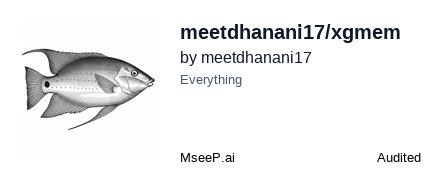xgmem
xgmem is a high-functionality memo management tool developed in JavaScript. Users can easily create, edit, and organize notes, providing an intuitive interface. It also includes search and tagging features, enabling efficient information management. Notably, the collaboration features are enhanced, allowing for real-time teamwork.
GitHub Stars
5
User Rating
Not Rated
Favorites
0
Views
356
Forks
1
Issues
0
xgmem MCP Memory Server
xgmem is a TypeScript-based Model Context Protocol (MCP) server for enabling project-specific and knowledge graph-based memory for Claude, LLM agents, and other tools. It supports storing, retrieving, and managing entities, relations, and observations per project, with a focus on flexibility and cross-project knowledge sharing.
Features
- Knowledge graph storage for entities, relations, and observations
- CRUD operations via MCP tools
- Persistence to disk (memory.json)
- Docker and TypeScript support
Use Case
xgmem is ideal for:
- Agents and LLMs that need to store and retrieve structured memory (entities, relations, observations) per project.
- Cross-project knowledge sharing and migration.
- Scalable, disk-persistent, and queryable memory for agent ecosystems.
Usage
MCP Config Example
Add to your MCP config (e.g., for windsurf):
"mcpServers": {
"xgmem": {
"command": "npx",
"args": ["-y", "xgmem@latest"]
}
}
Install dependencies
npm install
Build
npm run build
Run (development)
npx ts-node index.ts
Run (production)
npm start
Docker
docker build -t xgmem-mcp-server .
docker run -v $(pwd)/memories:/app/memories xgmem-mcp-server
This will persist all project memory files in the memories directory on your host.
How to Save Memory (MCP API)
To save observations (memory) for a project, call the save_project_observations tool via the MCP API:
Example JSON:
{
"name": "save_project_observations",
"args": {
"projectId": "demo-project",
"observations": [
{
"entityName": "Alice",
"contents": [
"Alice joined Acme Corp in 2021.",
"Alice is a software engineer."
]
},
{
"entityName": "Bob",
"contents": [
"Bob joined Acme Corp in 2022.",
"Bob is a product manager."
]
}
]
}
}
You can use any compatible MCP client, or send this JSON via stdin if running the server directly.
Tooling and API
xgmem exposes the following tools:
save_project_observationsget_project_observationsadd_graph_observationscreate_entitiescreate_relationsdelete_entitiesdelete_observationsdelete_relationsread_graphsearch_nodessearch_all_projectsopen_nodescopy_memory
See the get_help tool (if enabled) for documentation and usage examples via the MCP API.
Configuration
- Set
MEMORY_DIR_PATHenv variable to change the memory storage directory (default:/app/memories).
License
MIT
0
Followers
0
Repositories
0
Gists
0
Total Contributions
The code-scanner-server is a CLI tool and MCP server built with TypeScript and Node.js that scans code files for definitions such as classes and functions. It respects .gitignore, provides line numbers, and outputs in LLM-friendly formats like XML and Markdown. Utilizing the Tree-sitter parsing library, it analyzes source code and extracts structural information, supporting multiple programming languages.
